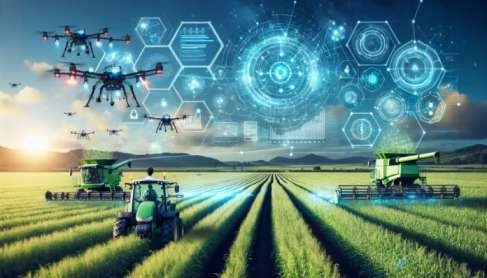In the realm of agriculture, the integration of artificial intelligence (AI) is revolutionizing traditional farming practices, offering innovative solutions to optimize crop yields and promote sustainability. With the power of AI-driven algorithms and data analytics, farmers can now make informed decisions, streamline operations, and mitigate environmental impact. In this blog, we will delve into the transformative role of AI in agriculture, exploring the tools and technologies that are unlocking the potential for sustainable harvests.
Understanding AI in Agriculture
AI encompasses a diverse range of technologies, including machine learning, computer vision, and predictive analytics, all of which have found applications in the field of agriculture. These AI-driven tools enable farmers to collect and analyze vast amounts of data, ranging from soil conditions and weather patterns to crop health and yield forecasts, to optimize farming practices and resource allocation.
Precision Farming with AI
One of the primary ways AI is revolutionizing agriculture is through precision farming techniques. AI-powered drones equipped with cameras and sensors can capture high-resolution images of fields, allowing farmers to monitor crop health, detect pest infestations, and identify areas requiring irrigation or fertilization with unprecedented accuracy. By analyzing this data, AI algorithms can generate actionable insights, enabling farmers to make targeted interventions and optimize crop yields while minimizing resource usage.
Optimizing Crop Management
AI-driven crop management systems offer farmers advanced tools for optimizing planting, harvesting, and post-harvest processes. By analyzing historical data and real-time environmental factors, AI algorithms can generate planting schedules, determine optimal crop varieties, and predict harvest times with greater precision. Additionally, AI-powered sorting and grading systems can enhance post-harvest efficiency, ensuring that only the highest-quality produce reaches the market.
Sustainability in Agriculture
AI holds immense promise for promoting sustainability in agriculture by optimizing resource usage, reducing waste, and mitigating environmental impact. By precisely managing inputs such as water, fertilizers, and pesticides, AI-powered systems help farmers minimize chemical runoff and soil erosion while maximizing crop productivity. Furthermore, AI-driven predictive analytics can anticipate shifts in weather patterns and climate conditions, enabling farmers to adapt their practices and mitigate risks associated with climate change.
Challenges and Considerations
While the integration of AI in agriculture offers significant benefits, it also presents unique challenges and considerations. Chief among these is the need for access to reliable data and infrastructure, particularly in rural areas where internet connectivity may be limited. Additionally, concerns surrounding data privacy, ownership, and security must be addressed to ensure that farmers retain control over their data and benefit from AI-driven insights without compromising confidentiality or intellectual property rights.
The Role of Generative AI in Healthcare
Innovations in AI, such as Generative AI in healthcare, offer valuable insights and methodologies that can be applied to agriculture. Generative AI algorithms have the capability to generate synthetic agricultural data, such as simulated weather patterns and crop growth scenarios, enabling farmers to conduct comprehensive risk assessments and scenario analyses. By harnessing the power of Generative AI, farmers can enhance their decision-making processes and optimize resource allocation for sustainable farming practices.
Personalized Learning Solutions in Agriculture
Within the realm of agriculture, the integration of artificial intelligence (AI) is not just about optimizing crop yields; it\'s also about tailoring farming practices to individual needs and conditions. AI-driven personalized learning solutions offer farmers the ability to adapt their approaches based on real-time data analytics. By utilizing AI-powered platforms, farmers can personalize their strategies for specific crops, soil conditions, and weather patterns, ultimately leading to more efficient and sustainable farming practices.
AI Chatbot Development Services for Farmers
In addition to personalized learning solutions, AI chatbot development services are transforming the way farmers access information and support. These chatbots, equipped with natural language processing capabilities, provide farmers with instant assistance and guidance on various farming-related queries. Whether it\'s troubleshooting technical issues with agricultural equipment or seeking advice on pest management strategies, AI chatbots offer farmers a convenient and accessible resource to enhance their farming practices and decision-making processes.
Enhancing Agricultural Efficiency Through AI
By leveraging personalized learning solutions and AI chatbot development services, farmers can streamline their operations, optimize resource allocation, and maximize crop yields while minimizing environmental impact. These AI-driven tools empower farmers with actionable insights and support, enabling them to make informed decisions and adapt to changing conditions effectively. As agriculture continues to evolve, AI will play an increasingly pivotal role in shaping the future of farming, unlocking new possibilities for sustainable agriculture and global food security.
Conclusion
In conclusion, AI holds immense potential for transforming agriculture and unlocking sustainable yields for farmers worldwide. From precision farming techniques to optimized crop management systems, AI-driven tools and technologies offer innovative solutions to address the challenges facing modern agriculture. As we continue to harness the power of AI in agriculture, it is imperative that we address challenges surrounding data access, privacy, and security to ensure equitable access to AI-driven insights and promote sustainable farming practices. With AI at the forefront, the future of agriculture is poised for unprecedented innovation and growth, paving the way for a more resilient, efficient, and sustainable food supply chain.



